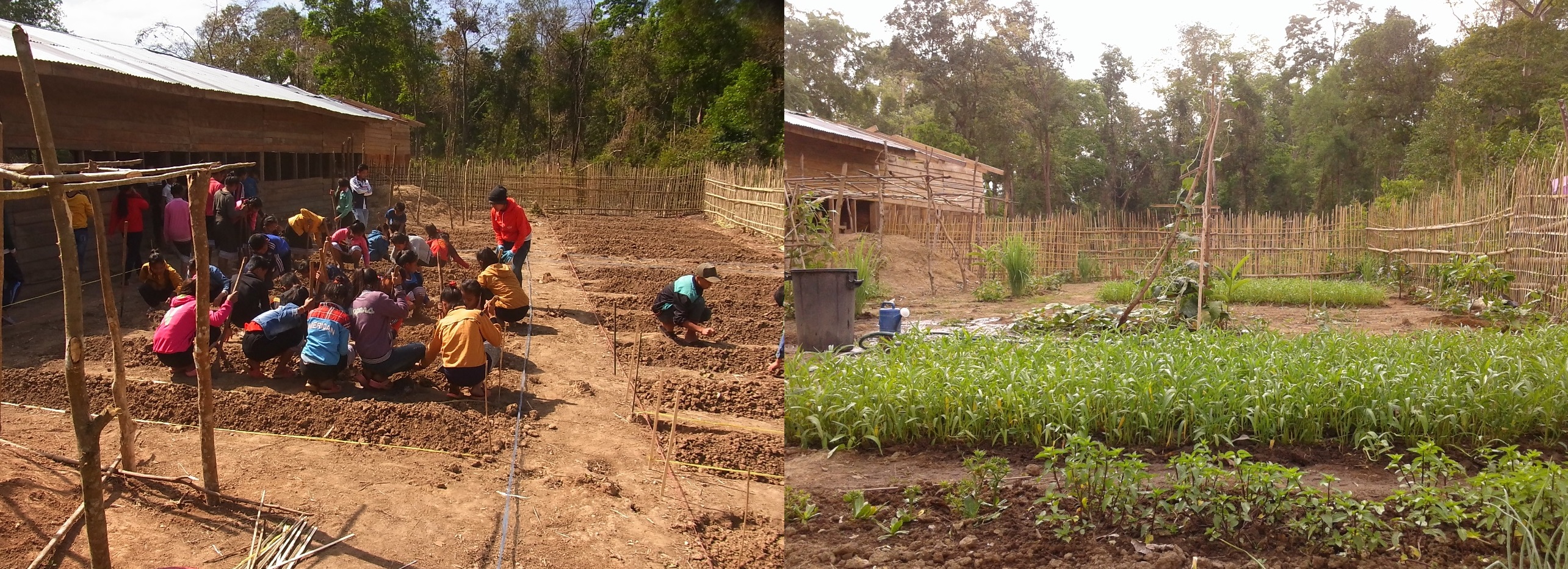Environmental education with school students of Nong Ping village, Bualapha District
By Thomas Wiedenmann
On 10th of May the Outreach Unit of Hin Nam No National Protected Area (HNN NPA) visited Nong Ping village in Boualapha District in order to follow-up on its school garden project. The garden was set-up earlier this year and after the first three months, the team of government volunteers and GIZ advisors was more than curious to get to know the results and experiences so far. For the experts on environmental education it was not only interesting to see if and how the vegetables grow. They were even more eager to inquire about the student’s experiences with the small project and their understanding about the linkage between school garden and nature conservation.
After three months the school garden is performing satisfactory. Vegetables are growing, maintenance work like weeding and watering seem to be done frequently. The organisation of the students and the division of tasks among different groups of students from primary and secondary school is working. It was reported by the students that the first vegetables were already harvested and contributed to the meals provided during village meetings. This enriches the diet of the students and their families.
During the morning of the follow-up visit, the students repeated the necessary technical steps for setting-up and maintaining the garden. From soil preparation and proper fencing, to harvesting and storing seeds for continuous vegetable production. Some games and ice breakers were part of the program and helped to keep the concentration of the participants. Higher grade students were supposed to bring forward their understanding and experiences with the garden. Thus, questions like: “Why do we have a school garden?”, “What is the benefit of a school garden?” and “What are the difficulties of maintaining a school garden?” were discussed. Practical reasons dominate the student’s answers: Contribution to food security, saving money and the joy of organic vegetables were the main points. That the garden project also provides new knowledge, practical skills, strengthens solidarity among the children and promotes endurance and diligence were some answers on a more abstract level. The kids described difficulties representing the reality of practical gardening and rural village conditions such as the lack of water, insect attacks, low quality of seeds and not enough tools for gardening. What was not mentioned at all were the aspects of conservation. The experts then provided clarifying explanations in order to cover this topic while pointing out that the maintenance of such an artificial ecosystem requires a lot of effort and constant struggle. At the same time, the natural forests surrounding Nong Ping village provide even more products and services. They do it best without any human interference. A very crucial point for the visiting team of HNN NPA was that growing vegetables for subsistence is not so common in the students’ families. Only some of them grow veggies on the shores of the Xe Bangfai River after the rainy season. Additionally, home gardens around the houses are more sporadic than common. This hints to the fact that villagers’ nutrition is not very varied and that the main source of food supply is provided by the natural ecosystem, besides sticky rice from their paddy fields.
This small-scale school garden is a first step to promote vegetable production on family level and educates the new generation of villagers with practical skills. Furthermore, they experience that starting something new can be beneficial for their health while lowering the pressure on their surrounding ecosystem. Thus awareness is raised for the appreciation of natural ecosystems where neither maintenance nor human intervention is required for proper functioning. The team of government volunteers and GIZ advisors will again follow-up on the progress of the school garden after the rainy season when Nongping village will be accessible by road, again.

